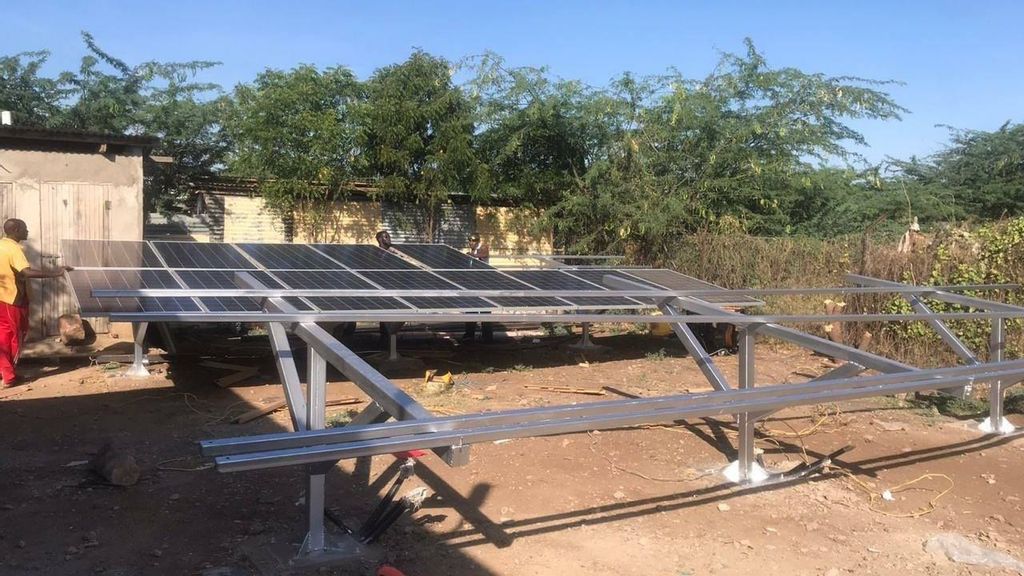KAKUMA, Kenya — Kakuma, Kenya’s second-largest refugee camp is blessed with an abundance of natural sunlight, but when night approaches, darkness engulfs the camp, but a Congolese refugee is out to light up the camp through solar green energy.
Only 1 per cent of over 200,000 refugees in the camp have access to electricity through the main power grid.
When Vasco Hamisi arrived at Kenya’s Kakuma refugee camp 12 years ago after fleeing fighting in his hometown in the Democratic Republic of Congo, he encountered a problem that disturbed him for quite some time.
“ When I arrived, I would see businesses close, and people retreat to their homes early as night fall struck. The camp was engulfed in darkness due to lack of electricity” Hamisi narrates.
Disturbed and perturbed by the problem, Hamisi had to be part of finding a solution.

“Communicating was hard because you could not even charge your phone and this pushed me into finding a solution,” he said.
In 2018, eight years into his stay at the refugee camp, Hamisi started a community-based organization to help find solutions to the camp’s energy needs through the provision of solar energy.
Hamisi would later set up Okapi Green Energy, a private firm specializing in solar energy.
In 2021, the government of Kenya gave the company the license to operate and supply power in the camp.
With financial support from Power Africa and the Smart Communities Coalition, Hamisi would set up a 10-kilowatt solar mini-grid at the Kakuma refugee camp located in the North-western part of Kenya.
Currently, Hamisi through his company, supplies clean energy to more than 200 businesses inside and outside the camp and other hundreds of refugee households.
“Through green energy we have been able to solve the problem to some extent. Refugees who have been connected to our grid no longer have to budget for torch batteries,”
“ It gives me satisfaction to see the small difference we can make in the society we live in through our own little efforts,” Hamisi noted.
Bitisho Tusambe, a Congolese refugee and mother of three is among the hundreds of beneficiaries enjoying power supplied by Hamisi.
Tusambe operates a small shop inside the refugee camp. She offers mobile charging, printing, photocopying and photography services.
“Initially, I would operate for only a few hours a day because the government supplied power was not reliable and those who supplied us with generator power would only do so for a few hours”
“Currently, with constant and uninterrupted supply of solar power, I’m able to operate full time,”Tusambe said.
She has even expanded her business by buying a refrigerator that stores cold drinks like water and fruit juice which sells like hotcake in the arid area.
South Sudanese refugee Grace Malong, the solar power has given her home comfort and enable her two children to study and complete their homework at night.
“My children can now enjoy watching their favorite movies on TV and do their schoolwork comfortably unlike before when they had to rely on lamp lights,” said Grace.
Refugees must rely on expensive, unstable, and unreliable alternative sources like diesel generators.
Hamisi explains that solar energy is helping refugee families save money and use it for other pressing needs.
“Initially they would pay up to US$15 for unreliable power, but now with reliable clean power supply, refugees are only paying half that amount,” Hamisi said.
And apart from providing a solution to the energy crisis in the camp, the Okapi energy project is also creating employment opportunities to youth in the refugee camp.
Currently, Hamisi employs 10 staff at his power plant, most of them refugees.
Hamisi is now focussing on the second phase of the green energy project which he says will be transformational.
The second phase of the project targets to supply green and clean energy to some 15,000 refugee homes and businesses in the camp.
Already, Okapi has received further support from EDP Portugal and Energy for Impact UK, to double the size of its mini-grid and further expand the number of beneficiaries.
Recommended from our partners
The post A Congolese Refugee Refused To Accept The Lack Of Electricity At His Refugee Camp— So He Built A Mini Solar Power Grid appeared first on Zenger News.
